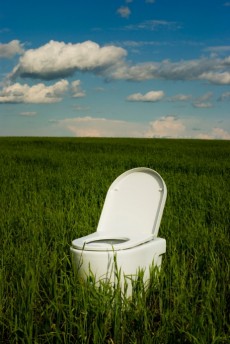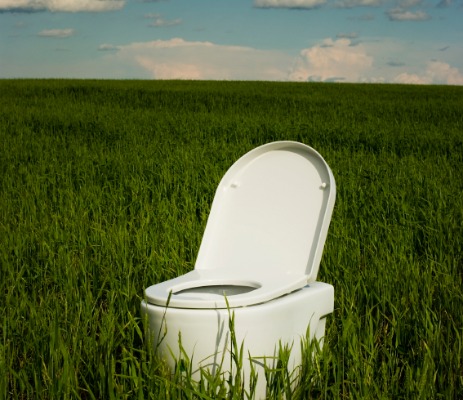 Coming soon to a senator’s house near you?When The New York Times wants really thoughtful, meaty commentary on issues like climate legislation, green technology, or local food systems, it turns to Grist writers David Roberts and Tom Philpott. When it wants toilet talk, it turns to … me.
Coming soon to a senator’s house near you?When The New York Times wants really thoughtful, meaty commentary on issues like climate legislation, green technology, or local food systems, it turns to Grist writers David Roberts and Tom Philpott. When it wants toilet talk, it turns to … me.
At least, that’s what happened this past week, when the editor of the Room for Debate forum approached and asked if I’d weigh in on Sen. Rand Paul’s bizarre outburst at a Senate hearing on energy efficiency — which David has since responded to with the generous offer of a new toilet. In fact, in true Grist style, we took the toilet theme and ran with it, offering readers a chance to win a free low-flow toilet of their own.
Meanwhile, I churned out the required 300 words, laced it with as much potty humor as I could, and turned it in. Sadly, the phrase “diarrheic diatribe” did not make the final cut, and somehow the verb “disemboweled” got taken out too. I also floated the title of Chief Pottymouth for my bio, an option the editor politely passed over. I’m not sure what’s more tragic, the high standards of the Times or my eternally low ones.
Anyhow, here’s the resulting roundtable, which includes comments from Juliet Schor of the Center for a New American Dream, Peter van Doren of the Cato Institute, Christopher Horner of the Competitive Enterprise Institute, and Tamar Krishnamurti of Carnegie Mellon.
When I read the other entries, I wished I’d spent less time on my punny throne and more time inverting the issue, the way Schor did. Instead of talking about why Americans don’t want to be more energy-efficient, she suggests that notion is basically a lie spread by climate deniers and the fossil-fuel industry.
I like what she had to say, and I hope she’s right. But to be honest, I’m not so sure. When you think about the people you know — neighbors, co-workers, taxi drivers — are they clamoring for CFLs? Are they seeking out the Energy Star label and demanding low-flow lifestyles? I think the answer might still be no for plenty of people. But I hope federal standards push it more and more toward yes.
Here’s what I wrote:
Last week, Senator Rand Paul made headlines — and punchlines — by spewing invective at a Department of Energy official because, to quote part of his diatribe, “my toilets don’t work in my house.” One of several Republicans burning with rage at an energy-efficiency hearing, Senator Paul faulted the administration for being pro-choice on abortion but “anti-choice on every other consumer item.”
Putting aside the fact that Senator Paul apparently considers abortion a consumer item, it’s worth probing the source of his ire. Because he is not alone. Across the country, Americans have long balked at being encouraged to buy funny-looking light bulbs and wimpy low-flow toilets. Now that the government is moving from encouraging to mandating — in the form of new standards that will begin phasing out energy-sucking bulbs later this year — passions are rising even higher.
What’s the source of this resistance, which lands us squarely behind those energy-savvy Europeans and Australians? Is it the good old pioneer spirit that prizes independence and property rights above all? Is it the fact that Americans are used to having all the cheap energy and whooshing all the toilet-bowl water we want? Is it that we fight change tooth and nail as a matter of course, or that we have been conditioned, through decades of advertising, to spend more than we have, destroying the “energy efficiency saves money” argument?
No doubt some combination of the above, but Senator Paul’s tirade suggests there’s one more key issue at play. “I’ve been waiting 20 years to talk about how bad these toilets are,” he said, and perhaps his outdated fixtures are just the problem. When early adopters leaked the news that newfangled toilets didn’t flush right and CFLs gave off an eerie glow, the rest of us got scared. But that was 20 years ago.
These technologies have improved immensely, and their benefits are beyond question; regulation should spur even more progress. If America is what it claims to be — a land of innovation, competition and pride — we should be eager to use our buying power to make these products even better, and to render Paul’s brand of potty politics moot.



